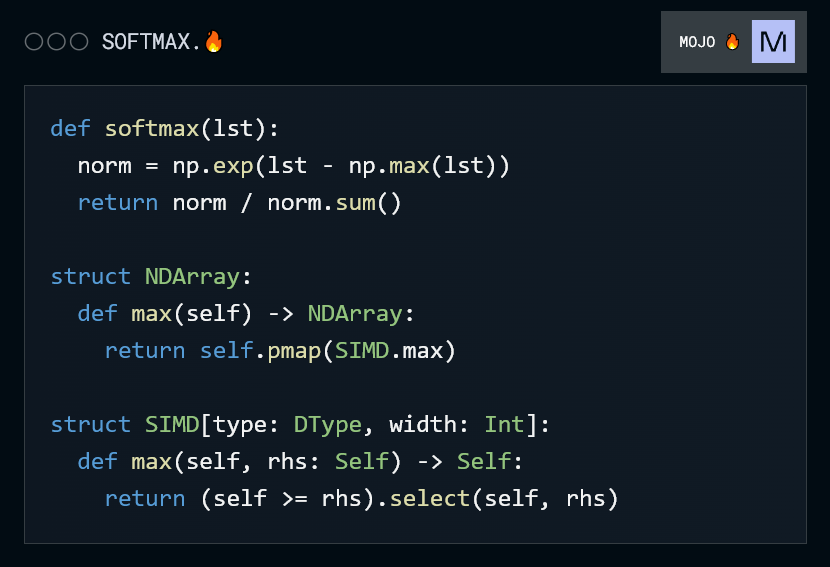Mojo Revolutionizes Python Programming with Advanced Capabilities for Artificial Intelligence and Machine Learning Applications
Python has become the de facto programming language in the field of artificial intelligence (AI) and machine learning (ML) due to its simplicity, flexibility, and rich ecosystem. However, Python’s current implementation, CPython, faces several limitations when it comes to systems programming and performance, giving rise to the ‘two-world problem’ where Python and low-level languages like C and C++ must coexist to achieve high performance.
Introducing Mojo
Mojo is a new programming language designed to address these challenges, seamlessly integrating with the existing Python ecosystem and providing a solution that unifies systems programming and AI/ML development. Mojo aims to leverage Python’s strengths while overcoming its performance limitations, and accommodating the growing complexity of heterogeneous hardware accelerators and deployment challenges.
Mojo’s Key Features and Compatibility
Mojo is designed to be fully compatible with the Python ecosystem, allowing developers to run existing Python 3 code ‘out of the box’ using CPython’s runtime. This ensures full compatibility with the entire Python ecosystem, while also enabling a smooth migration path for Python code to Mojo.
Mojo is a powerful programming language designed as a superset of Python, with features such as strong type checking, overloaded functions, and stricter function declarations (fn). These enhancements provide more control, predictability, and safety in code, making Mojo particularly suitable for systems programming and AI/ML development.
Mechanical Migrator
Mojo provides a mechanical migrator that offers high compatibility, allowing developers to progressively move their code to Mojo. This approach is inspired by the successful migration from Objective-C to Swift performed by Apple.
Motivation Behind Mojo
The primary motivation for developing Mojo is to bring an innovative programming model to accelerators and other heterogeneous systems commonly found in AI and ML. With the increasing complexity and variety of hardware accelerators, there is a pressing need for a unified language that caters to the requirements of AI/ML development and systems programming.
By embracing Python and completing its capabilities for systems programming and AI/ML, Mojo aims to address the two-world problem, eliminate the need for C or C++ within Python libraries, and provide the highest performance possible. This positions Mojo as a powerful language for AI/ML development, capable of driving innovation and overcoming fragmentation in the field.
Mojo’s Powerful Systems Programming Extensions
In this section, we will explore some of the powerful systems programming extensions offered by Mojo, which are built on top of Python and aimed at enhancing the language’s capabilities for AI/ML and systems programming.
let Statement
Mojo introduces a new keyword let to declare variables with immutable values. This ensures that once a variable is initialized, its value cannot be changed.
let x = 5;
x = 10; // compile-time error
strong Type Checking
Mojo allows you to employ strong type checking using its struct type. This ensures that the correct data types are used and provides compile-time errors for any mismatches.
pairTest() -> Bool:
let p = MyPair(1, 2)
return True // compile-time error: mismatched types
Overloaded Functions & Methods
Mojo supports overloaded functions and methods, allowing you to define multiple functions with the same name but different arguments.
struct Complex:
var re: F32
var im: F32
fn __init__(self&, x: F32):
self.re = x
self.im = 0.0
fn __init__(self&, r: F32, i: F32):
self.re = r
self.im = i
fn Declaration
Mojo introduces the fn declaration, which is a stricter version of the def declaration. While both fn and def are interchangeable on an interface level, fn enforces more restrictions in its body, making it suitable for systems programming.
fn myFn(x: F32) -> F32:
// fn's argument values are immutable by default
return x * 2
// fn requires type specifications for arguments and return values
fn myFn(x: F32) -> F32:
return x * 2
Strong Type Checking with Struct
Mojo allows you to use strong type checking with the struct keyword, which ensures that the correct data types are used.
struct Complex:
var re: F32
var im: F32
fn myFn(x: Complex) -> F32:
return x.re * 2 // compile-time error: mismatched types
Conclusion
Mojo extends Python’s capabilities by offering strong type checking, overloaded functions, and a stricter alternative to the def declaration. These features cater to the needs of systems programmers and developers who seek more control, predictability, and safety in their code. As a result, Mojo has the potential to revolutionize AI/ML development and improve performance across the board.
References





